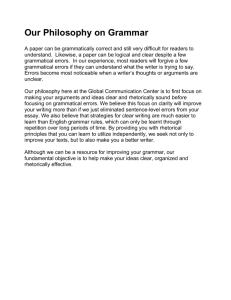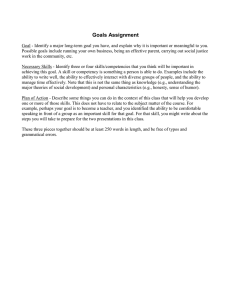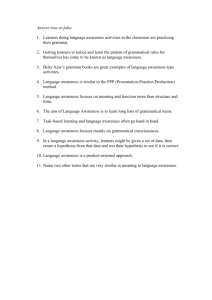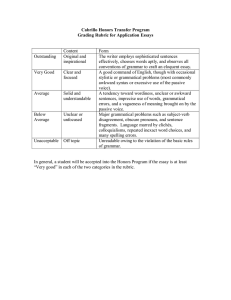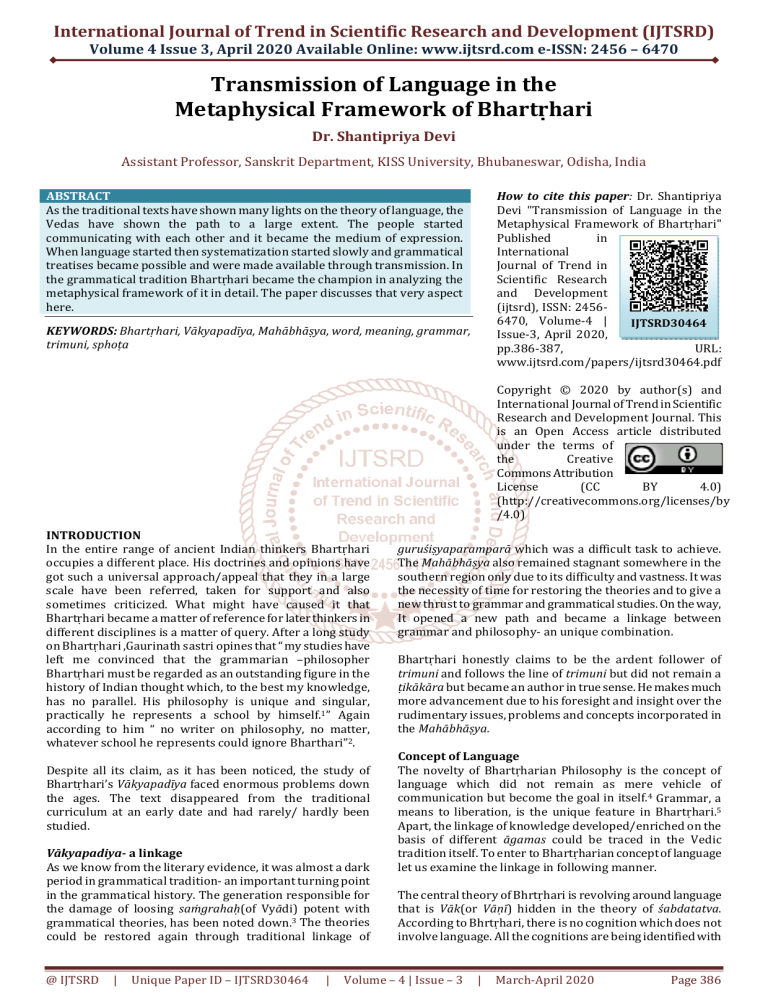
International Journal of Trend in Scientific Research and Development (IJTSRD) Volume 4 Issue 3, April 2020 Available Online: www.ijtsrd.com e-ISSN: 2456 – 6470 Transmission of Language in the Metaphysical Framework of Bhartṛhari Dr. Shantipriya Devi Assistant Professor, Sanskrit Department, KISS University, Bhubaneswar, Odisha, India How to cite this paper: Dr. Shantipriya Devi "Transmission of Language in the Metaphysical Framework of Bhartṛhari" Published in International Journal of Trend in Scientific Research and Development (ijtsrd), ISSN: 24566470, Volume-4 | IJTSRD30464 Issue-3, April 2020, pp.386-387, URL: www.ijtsrd.com/papers/ijtsrd30464.pdf ABSTRACT As the traditional texts have shown many lights on the theory of language, the Vedas have shown the path to a large extent. The people started communicating with each other and it became the medium of expression. When language started then systematization started slowly and grammatical treatises became possible and were made available through transmission. In the grammatical tradition Bhartṛhari became the champion in analyzing the metaphysical framework of it in detail. The paper discusses that very aspect here. KEYWORDS: Bhartṛhari, Vākyapadīya, Mahābhāṣya, word, meaning, grammar, trimuni, sphoṭa Copyright © 2020 by author(s) and International Journal of Trend in Scientific Research and Development Journal. This is an Open Access article distributed under the terms of the Creative Commons Attribution License (CC BY 4.0) (http://creativecommons.org/licenses/by /4.0) INTRODUCTION In the entire range of ancient Indian thinkers Bhartṛhari occupies a different place. His doctrines and opinions have got such a universal approach/appeal that they in a large scale have been referred, taken for support and also sometimes criticized. What might have caused it that Bhartṛhari became a matter of reference for later thinkers in different disciplines is a matter of query. After a long study on Bhartṛhari ,Gaurinath sastri opines that “ my studies have left me convinced that the grammarian –philosopher Bhartṛhari must be regarded as an outstanding figure in the history of Indian thought which, to the best my knowledge, has no parallel. His philosophy is unique and singular, practically he represents a school by himself.1” Again according to him “ no writer on philosophy, no matter, whatever school he represents could ignore Bharthari”2. Despite all its claim, as it has been noticed, the study of Bhartṛhari’s Vākyapadīya faced enormous problems down the ages. The text disappeared from the traditional curriculum at an early date and had rarely/ hardly been studied. Vākyapadiya- a linkage As we know from the literary evidence, it was almost a dark period in grammatical tradition- an important turning point in the grammatical history. The generation responsible for the damage of loosing saṁgrahaḥ(of Vyādi) potent with grammatical theories, has been noted down.3 The theories could be restored again through traditional linkage of @ IJTSRD | Unique Paper ID – IJTSRD30464 | guruśiṣyaparamparā which was a difficult task to achieve. The Mahābhāṣya also remained stagnant somewhere in the southern region only due to its difficulty and vastness. It was the necessity of time for restoring the theories and to give a new thrust to grammar and grammatical studies. On the way, It opened a new path and became a linkage between grammar and philosophy- an unique combination. Bhartṛhari honestly claims to be the ardent follower of trimuni and follows the line of trimuni but did not remain a ṭikākāra but became an author in true sense. He makes much more advancement due to his foresight and insight over the rudimentary issues, problems and concepts incorporated in the Mahābhāṣya. Concept of Language The novelty of Bhartṛharian Philosophy is the concept of language which did not remain as mere vehicle of communication but become the goal in itself.4 Grammar, a means to liberation, is the unique feature in Bhartṛhari.5 Apart, the linkage of knowledge developed/enriched on the basis of different āgamas could be traced in the Vedic tradition itself. To enter to Bhartṛharian concept of language let us examine the linkage in following manner. The central theory of Bhrtṛhari is revolving around language that is Vāk(or Vāṇī) hidden in the theory of śabdatatva. According to Bhrtṛhari, there is no cognition which does not involve language. All the cognitions are being identified with Volume – 4 | Issue – 3 | March-April 2020 Page 386 International Journal of Trend in Scientific Research and Development (IJTSRD) @ www.ijtsrd.com eISSN: 2456-6470 language. This is very basic presumption on which Bhartṛhari’s philosophy advances further. For Bhartṛhari the highest ontological form of Vāk is equated with caitanya11 (Consciousness). The language and thought are closely associated with each other. Thought itself is in the form of language and all our behavior is depending upon language12. Śabda according to him is equated with Parambrahma is nothing other than śabdaḥ.13 It is Vyākaraṇa which discriminates sādhuśabdas from asādhuśabdas and thus enjoy the status of Smṛti based on Śruti14. It is Vyākaraṇa which opens door to the salvation. The fact is that it reveals truthful knowledge that brings the real nature of the object by which the user could discriminate it. Through this he is developed to the extraordinary level and slowly attains the final goal. 4. The reason for admitting such views, I think is this- as it happens in case of researches in physical sciences, it does not so happen in the humanities. To prove one theory, it needs to discard the other theory. It is because the element of subjectivity is denied there whereas in humanities, despite all the logic and language, it cannot be denied and hence different apparently divergent views can be accommodated provided they are mutually contributory on the process of reconciliation. and Bhartṛhari could realize this fact. 5. Levels of Language According to Bhrtṛhari there are three levels of language through which śabda passes from speakers to listener. Śabda is internal but externalized for the purpose of communication. For Bhrtṛhari the highest ontological level is Brahman as śabdatatva. It is called paśyantī which is innermost stage and direct experiences of sphoṭa. At this stage there is no distinction between word and meaning and there is no temporal sequence in it. Although time is inherent in this stage, no sequence has yet occurred and it is pure potentiality. The next ontological level in descending order is that of madhyamā. At this level kāla begins to push or drive delimited portions of Brahman into sequence and comes to accomplish with the help of prāṇa or breath. In our experience of language this corresponds to the separation of unity sphoṭa in the mental sequence of thoughts. All the parts of speech that are linguistically relevant to sentences are present there in a latent form. The third level in descending order is vaikharī which is the external and differentiated level and in which vāk is commonly uttered by the speaker and heard by listener. Here speech is fully sequential through different sounds produced by the different places of articulation. 1. 2. 3. The origin of these three levels of language can be traced in Pāṇini’s Śikṣā where Pāṇini says: ātmā buddhyā sametyārthān mano yuṅkte vivakṣyā/ manaḥ kāyāgnimāhanti sa prerayati mārutam// mārutasturasi caran mandraṁ janayate svaram/ In Bhartṛhari’s framework the concept like śabda, pada, and vākya should be understood carefully. Whether Bhartṛhari postulated a 4th level of language that as parā as it is found elsewhere in Tantra system, is not known. But there is a different between Bhartṛhari and Nāgeśa. @ IJTSRD | Unique Paper ID – IJTSRD30464 | Bhartṛhari has admitted different divergent views/ theories on language. One such example is – bhinnaṁ darśanamāśritya vyavahāro’nugamyate/ tatra yanmurvyamekeṣāṁ viparyaya// Bhartṛhari’s theory of language is based on Vedic ideas though he does not show any dogmatic approach in accepting the other theories. The famous kārikā Bhartṛhari saysprajñāvivekaṁ labhate bhinnairāgamadarśanaiḥ/ kiyad vā śakyamunnetuṁ svatarkamanudhāvatā// VP. II.489 Conclusion Whatever it has been said the language has an evolution and development. It’s a gradual process but it has been critically examined by many writers simultaneously. There by learning the language one becomes accustomed with the society. Next follows the grammar as language requires systematization. Here the author Bhartṛhari in his text Vākyapadīya analyzes this fact with levels of understanding. Notes and References [1] The Philosophy of Word and Meaning (Gaurinath śāstrī:1983)P.XXV [2] Ibid [3] VP.11.481-487 [4] VP.1.132 [5] VP.1.14 [6] VP.1.5 [7] VP.1.9 [8] In Patañjali’s Mahābhāṣya we find two definitions of śabda of which the first one can be sphoṭarūpa śabda i.e., [9] pratītapadārthako loke dhvaniḥ śabdhaḥ ityucyate which can be considered as the definition of nādarūpaśabda [10] Vide the present article (p.43) [11] VP.I.126 [12] VP.I. [13] VP.I.1 [14] VP.I.142 Volume – 4 | Issue – 3 | March-April 2020 Page 387
